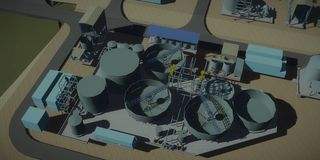Sh700 billion rare earth operation beckons

Ngualla Project construction is expected to cost approximately $320 million
What you need to know:
- The Ngualla Rare Earth Project (Ngualla Project), whose construction is expected to cost approximately $320 million (about Sh736 billion), has received impetus to begin implementation after the company, Peak Rare Earths Limited (based in the UK), revealed an invitation to attend an agreement signing ceremony next week in the capital Dodoma.
Dar es Salaam. Tanzania is on the verge of developing a world-class rare earth operation to support global decarbonisation, thanks to the mineral extraction project that may commence soon in the Songwe region, The Citizen has learnt.
The Ngualla Rare Earth Project (Ngualla Project), whose construction is expected to cost approximately $320 million (about Sh736 billion), has received impetus to begin implementation after the company, Peak Rare Earths Limited (based in the UK), revealed an invitation to attend an agreement signing ceremony next week in the capital Dodoma.
This comes after all other stages were given a nod by the cabinet, thus paving the way for a final agreement to be made.
A statement published on the company’s website yesterday reads, in part, “The Company is pleased to announce that it has been formally invited to a Framework Agreement Signing Ceremony for the Ngualla Rare Earth Project to be held on Monday, April 17, 2023, in Dodoma.”
According to the announcement, President Samia Suluhu Hassan is expected to preside over the ceremony.
It further reads, “This is a landmark milestone for the Ngualla Project and follows recent momentum around the finalisation of negotiations on the Framework Agreement with the Special Presidential Government Negotiation Team (“SPGNT”).”
Although a comment from the side of the government that is a partner in the project, including the Ministry of Minerals, could not be immediately obtained, the start of the project is another big step for the government to expand the rare earth sector.
Experts say that among the fastest-growing bases of the green energy revolution, rare earth elements are being used to make the electromagnets found in everything from electric cars to directing wind turbines.
“With tightening global emissions restrictions increasing demand for electric vehicles, cashing in on deposits of rare earth materials is a good way to secure a seat at the table of the blooming green economy,” Dr Ibrahim Sekei, a mineral expert, told The Citizen by phone interview.
He added that the success of the project will provide a global alternative source of the product to China (which accounts for 90 percent of global rare earth production) amidst continued trade tensions.
The project, an advanced rare earth development, is located near the Ngwala Village and approximately 150 km from the City of Mbeya in the Songwe Region and on the edge of the East African Rift Valley.According to Peak Rare Earths Limited’s website, the venture would see the construction of a mine, mill, concentrator, community projects, and associated infrastructure.
“Construction of the project is expected to cost approximately US$320 million and create around 600 direct and 3,000 indirect jobs during construction and around 220 direct and 1,000 indirect jobs during operations,” it indicates.
The Ngualla deposit is one of the world’s largest and highest-grade undeveloped rare earth deposits with a JORC ore reserve of 18.5 million tonnes at 4.8 percent Rare Earth Oxide (TREO), with the high-value rare earth elements neodymium and praseodymium accounting for 23 percent of Ngualla’s total TREO content, the website shows.
In this regard, Dr Sekei noted, “The development of Ngualla will provide the world with a critical supply of rare earths and play an important role in assisting the global green transformation process.
Further, the website notes that spot prices for elements (NdPr Oxide) have appreciated by approximately 160 percent through 2021 and are currently trading around US$140/kg as of January 2022.
The reasons, it states, include the rapidly growing demand for the product for use in electric vehicles, wind turbines, and consumer electronics as well as the growing need for diversity of supply, particularly in light of rising geopolitical and trade tensions.
The Ngualla project is said to be one of only a few globally that can be production-ready within the next five years.




